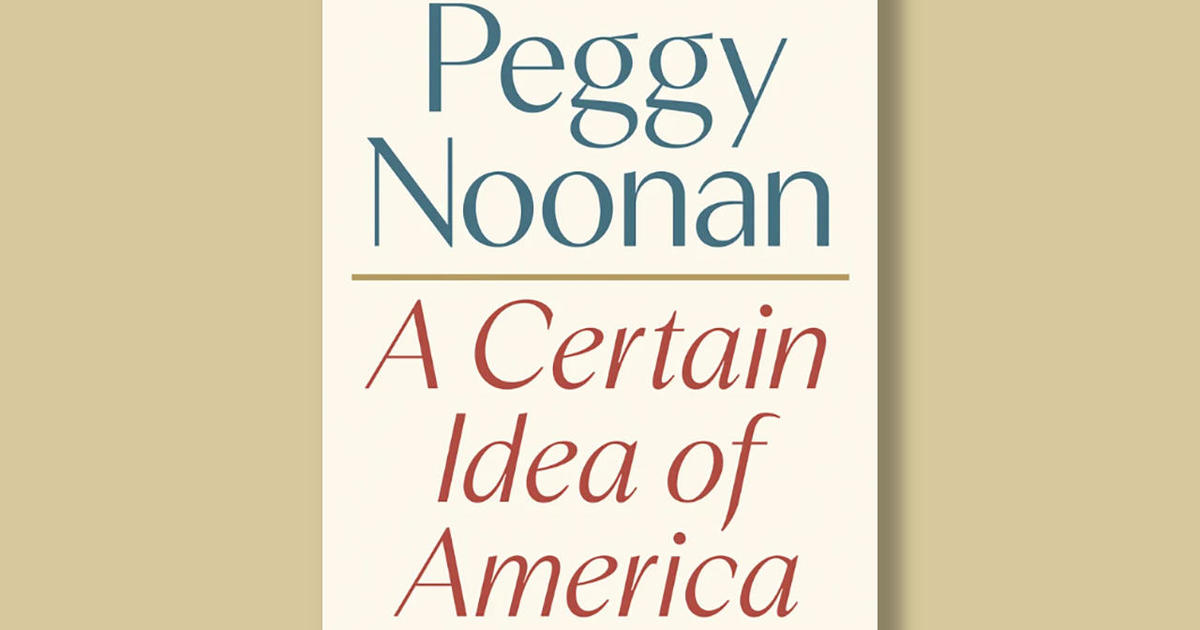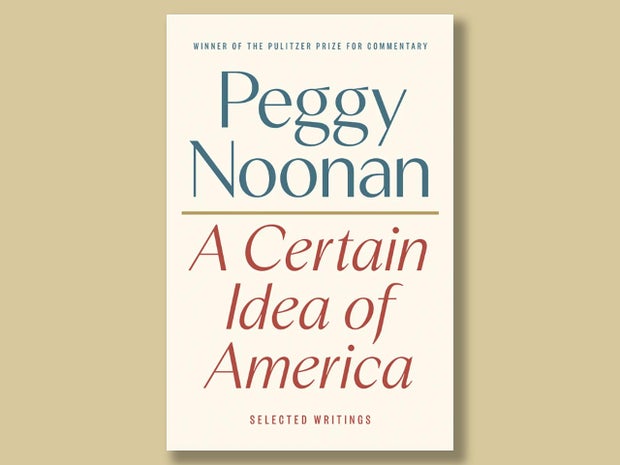Portfolio
We may receive an affiliate commission from anything you buy from this article.
In her new collection of columns from the Wall Street Journal, “A Certain Idea of America” (to be published November 19 by Portfolio), Pulitzer Prize-winner Peggy Noonan writes about the history and character of our nation, the remarkable figures who personify the best of America, threats to the social fabric, and the “better angels” of our democracy.
Read the foreword below, and don’t miss Robert Costa’s conversation with Peggy Noonan on “CBS Sunday Morning” November 17!
“A Certain Idea of America” by Peggy Noonan
Prefer to listen? Audible has a 30-day free trial available right now.
Foreword
This is not a book about the day to day of our national political life. It is simply about loving America and enjoying thinking aloud about it.
The columns gathered here are varied in terms of subject matter. They are about the things that endure, and things that deserve to be encouraged. A number of them are about spectacular human beings. As my editor and I read through the past few years of Wall Street Journal columns, if I said, “I really enjoyed writing that,” or she said, “I loved this,” or I said, “This was important to me,” it was in. If not, out. We chose about eighty from more than four hundred. We found ourselves most attracted to themes of history and its pleasures.
The book is divided into seven parts.
“Let Us Now Praise Famous Men” is mostly about great figures and artists of the twentieth century, from Billy Graham to Oscar Hammerstein, from Queen Elizabeth II to Senator Margaret Chase Smith of the state of Maine, and from Tom Wolfe to Bob Dylan, with some side trips to the nineteenth century and the generals of the American Civil War. Looking back on a career of now fifty years, I see that from the beginning what I have loved most, what has most moved me, is writing honest praise.
“I Don’t Mind Being Stern,” on the other hand, is about having fun, as a public writer, taking as big a stick as you can to people and things you are certain deserve it. The U.S. Senate changing its dress code to accommodate a senator who enjoys dressing like a child? Get the stick. Vengeful Prince Harry? Ditto. We were certain a recent Broadway production of Cabaret deserved our stern attention, in a piece whose last line is its summation: “Life Isn’t Merde.” We castigate men who aren’t gentlemen, and admonish parents who, as their personal vanity product, wind kids up to become mindless status robots. Also receiving fire are woke academics who speak garbage thoughts with garbage words. (I am sorry to use the word “woke,” which is boring and sounds merely sarcastic, but the thing is that when you say it, everyone pretty much knows what you mean.) I believe we were the first to compare contemporary social justice warriors with the practitioners of the struggle sessions of the Chinese Cultural Revolution. We enjoyed pointing out that the leaders of the French Revolution were, largely, sociopaths. There’s a piece written in the hours after January 6, 2021.
In “Try a Little Tenderness” we turn to love, which we posit as a very good thing. We call for artists to enter politics. We meditate, after the fire that swept the Cathedral of Notre Dame, in Paris, on the enduring presence and power of religious faith. We unabashedly love, we swoon over and wish to marry, Leo Tolstoy and War and Peace. We mourn for Uvalde, Texas. We talk about the endless drama of men and women, and instruct America that more happens every day in the office than business. Also we declare Taylor Swift an American phenomenon, and if you don’t like it you can just shake it off.
“It Appears He Didn’t Take My Advice” is two columns long. The first, on Joe Biden, was so spectacularly wrong in its central prediction that it made us laugh. Yet looking back five years, it seemed to me in its reasoning to be still oddly pertinent. The second, on Donald Trump, on the eve of the 2016 election, seems to me to have some prescience as to his central problems as a historical figure. Also in the writing of it I remember a feeling of poignance.
“On America” is about the foibles, troubles, and triumphs of our country. It includes the story of my great-aunt Jane Jane, and how, as an Irish immigrant, she came to love her new country. I’d say the general theme of this section is about keeping your poise under pressure. It includes recent college graduates, the Normandy invasion, and the spirited, against-the-grain testimony of an old-fashioned capitalist. Also included, a portrait of the dynamics that produced a political sea change: “The Protected Versus the Unprotected.”
“Watch Out” contains columns about the worries that preoccupy my mind: the dark potentials of AI, skepticism as to the character and motives of its inventors; the possible use of nuclear weapons, and the ongoing dramas in Ukraine and the Mideast.
“We Can Handle It” is about working our way, as a nation, through things that roil us, from the #MeToo movement to the abortion wars, from the creation of a sane foreign policy, to the low state of the American presidency.
This collection draws its title from the famous first sentence of Charles de Gaulle’s “War Memoirs,” most happily translated as “All my life I have had a certain idea of France.” It struck me when I read it many years ago and stayed with me because all my life I have had a certain idea of America, and from the beginning it shaped my thinking and drove my work.
What is that idea? That she is good. That she has value. That from birth she was something new in the history of man, a step forward, an advancement. Its founders were engaged in the highest form of human achievement, stating assumptions and creating arrangements whereby life could be made more: just. In the workings of its history I saw something fabled. The genius cluster of the Founders, for instance—how did it happen that those particular people came together at that particular moment with exactly the right (different but complementary) gifts? Long ago I asked the historian David McCullough if he ever wondered about this. He said yes, and the only explanation he could come up with was: “Providence.” That is where my mind settles, too.
De Gaulle said his thoughts on France were driven as much by emotion as reason, and the same for me. A piece in here dated July 3, 2019, speaks of both:
I’m not really big on purple mountain majesties. I’d love America if it were a hole in the ground, though yes, it’s beautiful. I don’t love it only because it’s “an idea,” as we all say now. That strikes me as a little bloodless. Baseball didn’t come from an idea, it came from us—a long cool game punctuated by moments of high excellence and utter heartbreak, a team sport in which each player operates on his own. The great movie about America’s pastime isn’t called Field of Ideas, it’s called Field of Dreams. And the scene that makes every grown-up weep is when the dark-haired young catcher steps out of the cornfield and walks toward Kevin Costner, who suddenly realizes, That’s my father.
He asks if they can play catch, and they do, into the night.
The great question comes from the father: “Is this Heaven?” The great answer: “It’s Iowa.”
Which gets me closer to my feelings on patriotism. We are a people that has experienced something epic together. We were given this brilliant, beautiful thing, this new arrangement, a political invention based on the astounding assumption that we are all equal, and that where you start doesn’t dictate where you’ll wind up. We’ve kept it going, father to son, mother to daughter, down the generations, inspired by the excellence and in spite of the heartbreak. Whatever was happening, depression or war, we held high the meaning and forged forward. We’ve respected and protected the Constitution.
And in the forging through and holding high we’ve created a history, traditions, a way of existing together.
We’ve been doing this for 243 years now, since the first Fourth of July and in spite of all the changes that have swept the world.
It’s all a miracle. I love America because it’s where the miracle is.
I would say of the above, welcome to my deepest heart.
You’ll see some of the U.S. Civil War here. It has been a lifelong preoccupation and followed my interest in Abraham Lincoln, whose life has gripped me since childhood. He is the only American president who was both a political and literary genius—literally, genius—and about him clung an air of the mystical. He was completely human (homely ways, off-color jokes, depressions, a writer of angry letters) and yet there was something almost supernatural in his ability to be fair, to be just, to be merciful toward his tormentors (the angry letters were thrown in a drawer). What a figure. Tolstoy thought him the greatest man in history.
Religious faith is a constant subtext here because it’s my constant subtext.
Anyway, America. With all her harrowing flaws (we have always been a violent country, for instance) she deserves from us a feeling of profound protectiveness. Our great job as citizens is to shine it up a little, make it better, and hand it on, safely, to the generation that follows, and ask them to shine it up and hand it on. I think that is often what I was trying to do. When you see this I will have been a weekly columnist in The Wall Street Journal for just shy of a quarter century. I am grateful I haven’t run out of opinions.
Excerpted from “A Certain Idea of America” by Peggy Noonan, in agreement with Portfolio, an imprint of Penguin Publishing Group, a division of Penguin Random House LLC. Copyright © 2024 Peggy Noonan.
Get the book here:
“A Certain Idea of America” by Peggy Noonan
Buy locally from Bookshop.org
For more info:


Leave a Reply